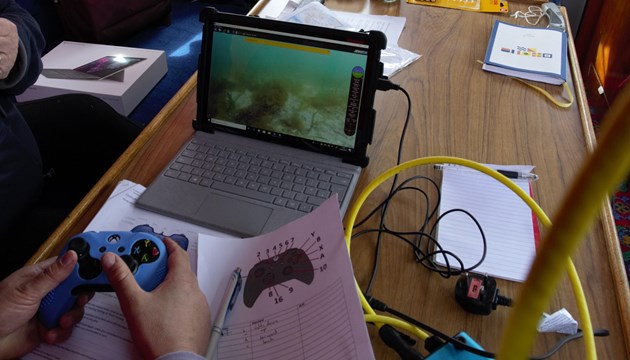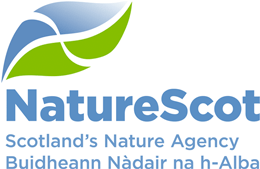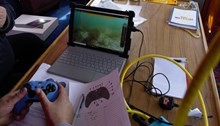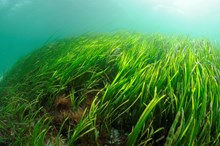18 October, 2022
New round of funding for community marine surveys announced

The second round of the Community Marine Equipment fund has been launched this month to help communities and local groups get involved in monitoring Scotland’s seabed and coastlines.
The Community Marine Monitoring Equipment Fund is offering support to groups around Scotland to buy equipment to record and monitor their local marine life.
The aim of the project is to enable communities and local groups to gain the skills, experience and knowledge to participate in biodiversity surveys in Scotland, helping to improve knowledge of marine species and habitats.
Individual grants of up to £1,500 will be offered for entry level equipment such as ID guides, quadrats and GoPros. Larger grants up to £3,000 are available for joint applications between two or more groups.
Applications should have an emphasis on enabling community and/or youth engagement in marine monitoring, and will be assessed on a rolling basis with a closing date of 1 June 2023.
The previous rounds have provided funding of £34,000 since 2019 to 22 organisations, ranging from the Berwickshire Marine Reserve to the Community of Arran Seabed Trust (COAST), the Knoydart Ranger Service, Shark and Skate Conservation Scotland, and Friends of the Sound of Jura. These groups used funds to buy equipment including for surveys of native oysters, flapper skates, sharks, whales, and other marine habitats and species.
The project is a partnership between NatureScot, Fauna & Flora International (FFI), communities, local groups and individuals, with funding support from the William Grant Foundation.
NatureScot project officer Lucy Cotgrove said: “People living in coastal communities around Scotland have told us they want to get more involved with protecting marine life, but may not have the equipment and resources to carry out monitoring. We encourage communities and local groups to apply to us for any survey equipment that will help them. Scotland’s coasts and lochs are special places for marine habitats and wildlife, and the information that volunteers collect is vital and helps support decisions on how to protect these areas. It also gives communities a way to contribute and play their part in protecting our marine environment”
Fauna & Flora International’s Project Manager for Scotland Rebecca Plant said: “Coastal communities across Scotland are well-placed to harness solutions to ensure healthy, well-managed seas, and many communities are looking to play a greater role in decisions around local and national marine management.
“The collection of marine data through surveying and monitoring is a key process underpinning decision-making, however there are barriers to community involvement.
“We hope that the collaborative Community Marine Biodiversity Monitoring Project will build participation in community-led marine data collection via the Equipment Fund and the Monitoring Handbook, empowering communities to play their part in the management of their local waters.”
Nick Addington, Chief Executive of the William Grant Foundation, said: “We’ve seen evidence of how effective modern survey technology is in the hands of community volunteers. We’re pleased to be supporting this fund to give more communities the chance to contribute to knowledge about their local coasts and waters.”
There is more information on the NatureScot website for applicants, who can also contact communitymarinesurvey@nature.scot with any questions.
Ends
Contact information
- Name
- NatureScot Media
- Telephone
- 0131 316 2655
- media@nature.scot
Notes to editors
More information on the fund, including a full list of all the organisations which received funding in the first round, is available here.
Fauna & Flora International’s (FFI) mission is to conserve threatened species and ecosystems, choosing solutions that are sustainable, based on sound science, and account for human needs. FFI’s approach is to work with in-country organisations - from local community groups and NGOs to small and large businesses and government agencies - believing that conservation impact is best achieved through the involvement of those affected by the decisions made. FFI’s Marine Community Support project launched in Scotland in 2014, in collaboration with the Community of Arran Seabed Trust (COAST), to provide direct support to active communities along Scotland’s coast. By enabling coastal community groups across Scotland to undertake positive action, and to work together to influence wider policy, FFI’s work harnesses social action and contributes to safeguarding and restoring Scotland’s precious marine environment.
The William Grant Foundation is a non-profit association established to support charitable causes in Scotland. Its work is funded by William Grant & Sons Ltd. For more information see the Foundation’s website www.williamgrantfoundation.com, or contact foundation@wgrant.com
NatureScot is Scotland's nature agency. We work to enhance our natural environment in Scotland and inspire everyone to care more about it. Our priority is a nature-rich future for Scotland and an effective response to the climate emergency. For more information, visit our website at www.nature.scot or follow us on X at https://x.com/NatureScot
’S e NatureScot buidheann nàdair na h-Alba. Bidh sinn a’ neartachadh àrainneachd na h-Alba agus a’ brosnachadh dhaoine gu barrachd suim a chur ann an nàdar. Tha e mar phrìomhachas againn gum bi nàdar na h-Alba beairteach agus gun dèilig sinn gu h-èifeachdach le èiginn na gnàth-shìde. Tha an tuilleadh fiosrachaidh aig www.nature.scot no air X aig https://x.com/NatureScot


